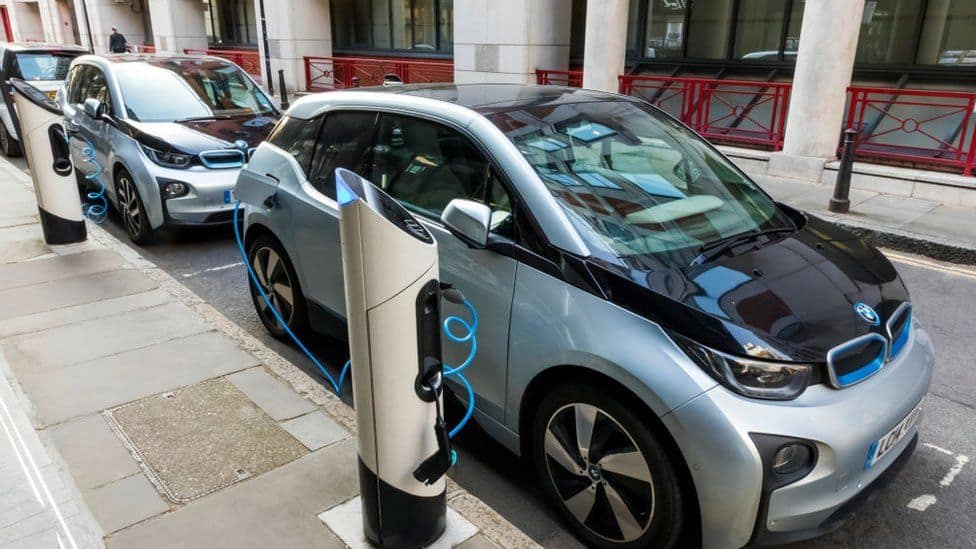The UK risks being left in the slow lane when it comes to building electric cars, according to a new report.
Influential green group Transport and Environment (T&E) says that since 2018, the UK produced roughly half of all electric cars built in Europe.
But it claims a lack of investment by UK manufacturers means that by the end of the decade that figure will have fallen to just 4%.
This comes at a time when the market is expanding rapidly.
As a result, the Brussels-based non-profit says that, despite being one of the first countries to outlaw the sale of new petrol and diesel cars, the UK will be almost wholly reliant on electric vehicles imported from abroad.
The market for electric cars remains relatively small, but it is growing rapidly, largely due to increasingly stringent emissions limits.
A number of European governments have already set targets for phasing out the sale of new petrol and diesel-powered vehicles, in their efforts to meet climate change targets.
The UK, which plans to ban the sale of most new cars with internal combustion engines by 2030, is among the most ambitious.
But according to the study by T&E, manufacturers based here are among the worst prepared for the change.
The BBC has approached the Department for Business, Energy and Industrial Strategy for comment.
The race for electric vehicles
T&E’s report is based on information compiled by industry data specialist IHS Markit, including the carmakers’ own market and production forecasts.
It concludes that by 2030, battery-powered electric cars will account for 48% of production across the 27 countries of the EU and the UK. Plug-in hybrids will make up 11%.
However, it suggests that the difference in the way manufacturers have approached the transition means that the balance of power in the industry is expected to change.
Germany is expected to remain the dominant car producer in Europe. By 2030, its output is expected to increase from 4.5 million cars a year to 5.1 million – with half of them being electric.
But the UK, it says, will see output fall from its pre-Covid level of 1.3 million cars a year to just 1 million – and only 24% are expected to be battery-powered electric vehicles.
The Society of Motor Manufacturers and Traders (SMMT), which represents the automobile industry, strongly refutes T&E’s conclusions.
“The accusation that UK car makers are not preparing for the shift to electrification is utter nonsense,” SMMT’s chief executive Mike Hawes told the BBC.
“The UK was home to the first mass-produced electric vehicle in Europe, almost one in four cars made here this year have been either battery electric or hybrid, and British brands have publicly committed to be amongst the first anywhere to be fully electric.”
He added that independent forecasts showed the UK was ramping up its production of electric vehicles and that it would be able to meet the government’s net zero 2030 ambitions.
“However, our ability to realise this opportunity still depends on the inherent competitiveness of the UK as a place to invest,” he stressed.
“The UK-EU trading rules will help but success will depend on greater backing for advanced manufacturing; reducing operating costs, investing in workforce skills and the maintenance of a healthy new car market.”
Criticism of carmakers
According to T&E, among the manufacturers with facilities in the UK, Toyota is “least prepared for the electrification revolution that is under way”.
This, the group says, is because of the Japanese company’s plans to continue building hybrid cars at its factory in Derbyshire. Rather controversially, it describes hybrids as “a 25 year-old outdated technology”.
Toyota has frequently defended its focus on hybrids in the past, saying it “believes it is better to maintain an open regulatory framework towards carbon neutrality and not limit possible technology solutions too early”.
The organisation is also critical of Jaguar Land Rover and BMW, owner of the Mini brand. It says Stellantis, which owns Vauxhall, “is better prepared to transition to electric cars but is focusing new electric car production in EU countries”.
It is worth pointing out, however, that Stellantis is still in talks with the government over the future of its plant at Ellesmere Port in Cheshire, which could lead to electric cars being built at the site.
The report also accepts that BMW’s plans to turn Mini into an all-electric brand could affect the forecasts it uses for UK production.
Nissan, meanwhile, is widely reported to have plans to expand battery production at its base on Teeside, with the construction of a new “gigafactory”.
But according to T&E, the plan – which would initially see the plant having a capacity of 6.5 Gigawatt hours (GWh), this amounts to “a tiny fraction of the 474GWh of production at 17 sites across Europe for which funding has already been secured”.
It adds: “A further 10 gigafactory projects (including BritishVolt) have been announced, which would take total cell production to over 1000GWh”.
But it claims these projects are unlikely to go ahead unless the government puts more pressure on carmakers.
Without strong pressure to change, it says “the UK car industry will wither away”.

